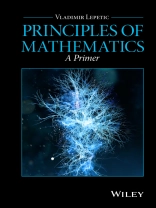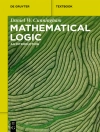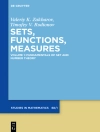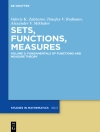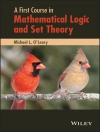Presents a uniquely balanced approach that bridges introductory and advanced topics in modern mathematics
An accessible treatment of the fundamentals of modern mathematics, Principles of Mathematics: A Primer provides a unique approach to introductory andadvanced mathematical topics. The book features six main subjects, whichcan be studied independently or in conjunction with each other including: settheory; mathematical logic; proof theory; group theory; theory of functions; andlinear algebra.
The author begins with comprehensive coverage of the necessary building blocks in mathematics and emphasizes the need to think abstractly and develop an appreciation for mathematical thinking. Maintaining a useful balance of introductory coverage and mathematical rigor, Principles of Mathematics: A Primer features:
* Detailed explanations of important theorems and their applications
* Hundreds of completely solved problems throughout each chapter
* Numerous exercises at the end of each chapter to encourage further exploration
* Discussions of interesting and provocative issues that spark readers’ curiosity and facilitate a better understanding and appreciation of the field of mathematics
Principles of Mathematics: A Primer is an ideal textbook for upper-undergraduate courses in the foundations of mathematics and mathematical logic as well as for graduate-level courses related to physics, engineering, and computer science. The book is also a useful reference for readers interested in pursuing careers in mathematics and the sciences.
สารบัญ
Preface xi
1 Set Theory 1
1.1 Introduction, 1
1.2 Set Theory – Definitions, Notation, and Terminology – What is a Set?, 3
1.3 Sets Given by a Defining Property, 15
1.4 The Algebra of Sets, 25
1.5 The Power Set, 41
1.6 The Cartesian Product, 44
1.7 The Sets N, Z, and Q, 46
1.8 The Set R – Real Numbers I, 71
1.9 A Short Musing on Transfinite Arithmetic, 80
1.10 The Set R – Real Numbers II, 102
1.11 Supplementary Problems, 109
2 Logic 115
2.1 Introduction, 116
2.2 Propositional Calculus, 121
2.3 Arguments I, 146
2.4 Arguments II, 167
2.5 A Short Revisit to Set Theory, 171
2.6 Boolean Algebra, 173
2.7 Supplementary Problems, 177
3 Proofs 183
3.1 Introduction, 183
3.2 Direct Proof, 193
3.3 Indirect Proof, 212
3.4 Mathematical Induction, 218
3.5 Supplementary Problems, 241
4 Functions 247
4.1 Introduction, 247
4.2 Relations, 248
4.3 Functions, 274
4.4 Supplementary Problems, 321
5 Group Theory 327
5.1 Introduction, 327
5.2 Fundamental Concepts of Group Theory, 328
5.3 Subgroups, 356
5.4 Cyclic Groups, 382
5.5 Homomorphisms and Isomorphisms, 385
5.6 Normal Subgroups, 404
5.7 Centralizer, Normalizer, Stabilizer, 412
5.8 Quotient Group, 419
5.9 The Isomorphism Theorems, 427
5.10 Direct Product of Groups, 437
5.11 Supplementary Problems, 441
6 Linear Algebra 447
6.1 Introduction, 447
6.2 Vector Space, 449
6.3 Linear Dependence and Independence, 456
6.4 Basis and Dimension of a Vector Space, 461
6.5 Subspaces, 469
6.6 Linear Transformations – Linear Operators, 477
6.7 Isomorphism of Linear Spaces, 489
6.8 Linear Transformations and Matrices, 501
6.9 Linear Space Mmn, 507
6.10 Matrix Multiplication, 509
6.11 Some More Special Matrices. General Linear Group, 514
6.12 Rank of a Matrix, 525
6.13 Determinants, 534
6.14 The Inverse and the Rank of a Matrix Revisited, 541
6.15 More on Linear Operators, 547
6.16 Systems of Linear Equations I, 585
6.17 Systems of Linear Equations II, 600
6.18 The Basics of Eigenvalue and Eigenvector Theory, 613
6.19 Supplementary Problems, 635
Index 645
เกี่ยวกับผู้แต่ง
Vladimir Lepetic, Ph D, is Professor in the Department of Mathematical Sciences at De Paul University. His research interests include mathematical physics, set theory, the foundations, and philosophy of mathematics.
